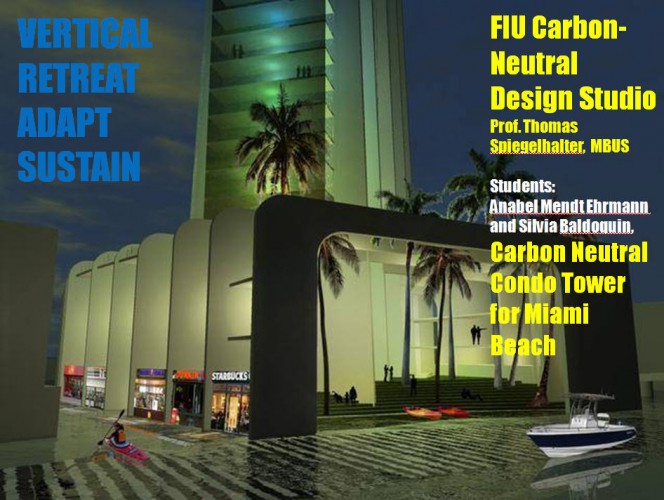Associate Professor and Co-Director of the Structures and Environmental Technologies Lab (SET Lab) Thomas Spiegelhalter was invited on behalf of the Association of Climate Change Officers and the National 2015 Rising Seas Summit Steering Committee to present some of his 25 years of collaborative design and research work in Europe, the U.S. and, specifically, at FIU at this year’s 3rd annual National Rising Seas Summit in Boston on November 4th.
The panel for “Adaptive Infrastructure” consisted of Chris Dorney (Senior Planner, WSP l Parsons Brinckerhoff), Robbin Peach (Program Manager of Resiliency, Massachusetts Port Authority), Craig Zamuta (Senior Policy Advisor for Climate & Environmental Analysis, U.S. Department of Energy), and Thomas Spiegelhalter (FIU). Professor Spiegelhalter gave the introductory lecture with the title “Mitigate, Adapt, Sustain: Design Protocols for Carbon-Neutral Adaptive Blue Infrastructures.” The panel presentations featured international, national and local macro-scale to micro-scale approaches for the resiliency of urban environments and energy and transportation systems. Adaptive infrastructure practices and scenarios were discussed in detail.
The two-day Rising Seas Summit brought professionals together to highlight the interrelationships between sea level rise, climate change and extreme events. This year’s marquee event was held at the Sheraton Boston Hotel Conference venue and was attended by over 350 professionals across sectors. As the recent findings related to the Antarctic ice shelves cast clearer light on rates of sea level rise, the coastal ecosystems and inland water systems are at even greater risk, and the recent catastrophic impacts from hurricanes and typhoons have made the need to plan for adaptation a clear and present necessity. These emerging and increasing environmental challenges require that stakeholders and planners share knowledge and work together to reduce and mitigate environmental, economic, and social degradation induced by climate change.
Spiegelhalter presented “what-if scenarios” that involve relinquishing space to water and integrating the natural regenerative potential of low-lying regions with adaptive, amphibious blue infrastructures. He mandated that holistic parametric-algorithmic planning with design agents should take full advantage of the dynamic relationship between land and water for flexible, carbon-neutral lifework hydro-geographies. These new geographies are more adaptable to climatically changing tides and seasons. He showed international built design protocols that demonstrate floating and renewable energy and water producing infrastructures and aquatic lifework networks with alluvial sponge combs to mitigate floods.
Spiegelhalter included research design projects entitled Intelligent Cities and Buildings that were developed and published under his supervision from 1990 to 1992 at the University Kaiserslautern in Germany. He showed the most recent work of The FIU College of Architecture + The Arts and its Miami Beach Urban Design Studios from 2009 to 2015, including the large-scale exhibition at the Coral Gables Museum, Miami 2100: Envisioning a Resilient Second Century, which was co-curated by FIU CARTA faculty Marta Canavés (FIU LAEUD Associate in Design) and Marilys Nepomechie, FAIA (FIU Professor of Architecture) and built by FIU Architecture Instructor Eric Peterson and a team of FIU design students.
This article was written by Associate Professor and Co-Director of the Structures and Environmental Technologies Lab (SET Lab) Thomas Spiegelhalter.
Follow FIU Architecture on Facebook, Twitter, and Instagram.



